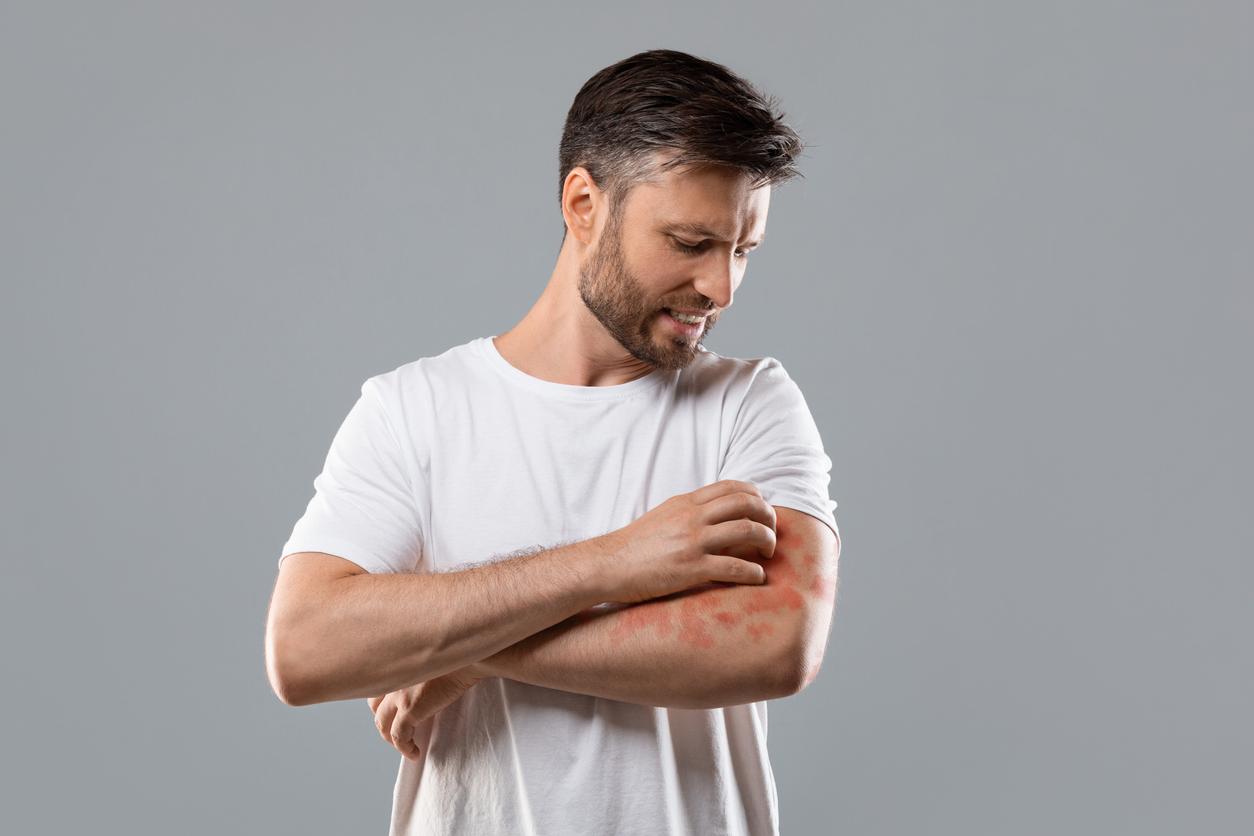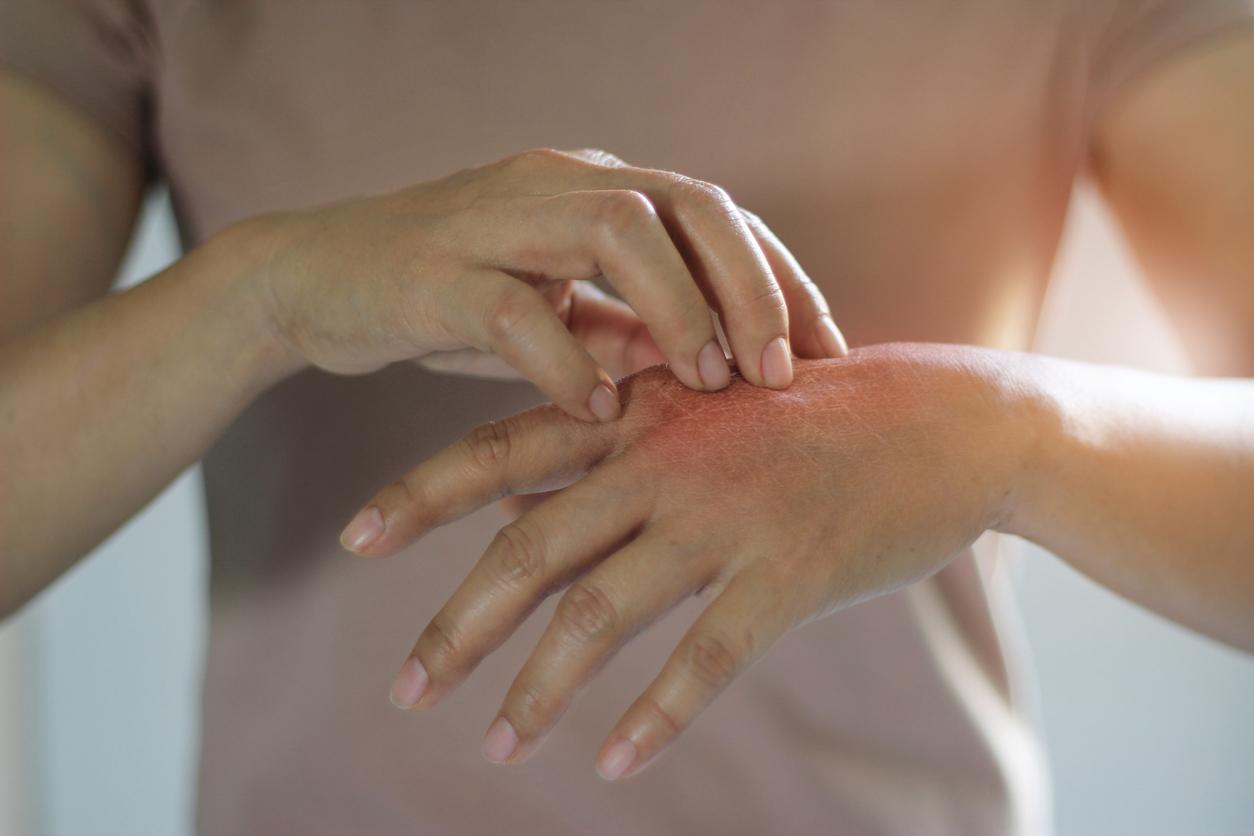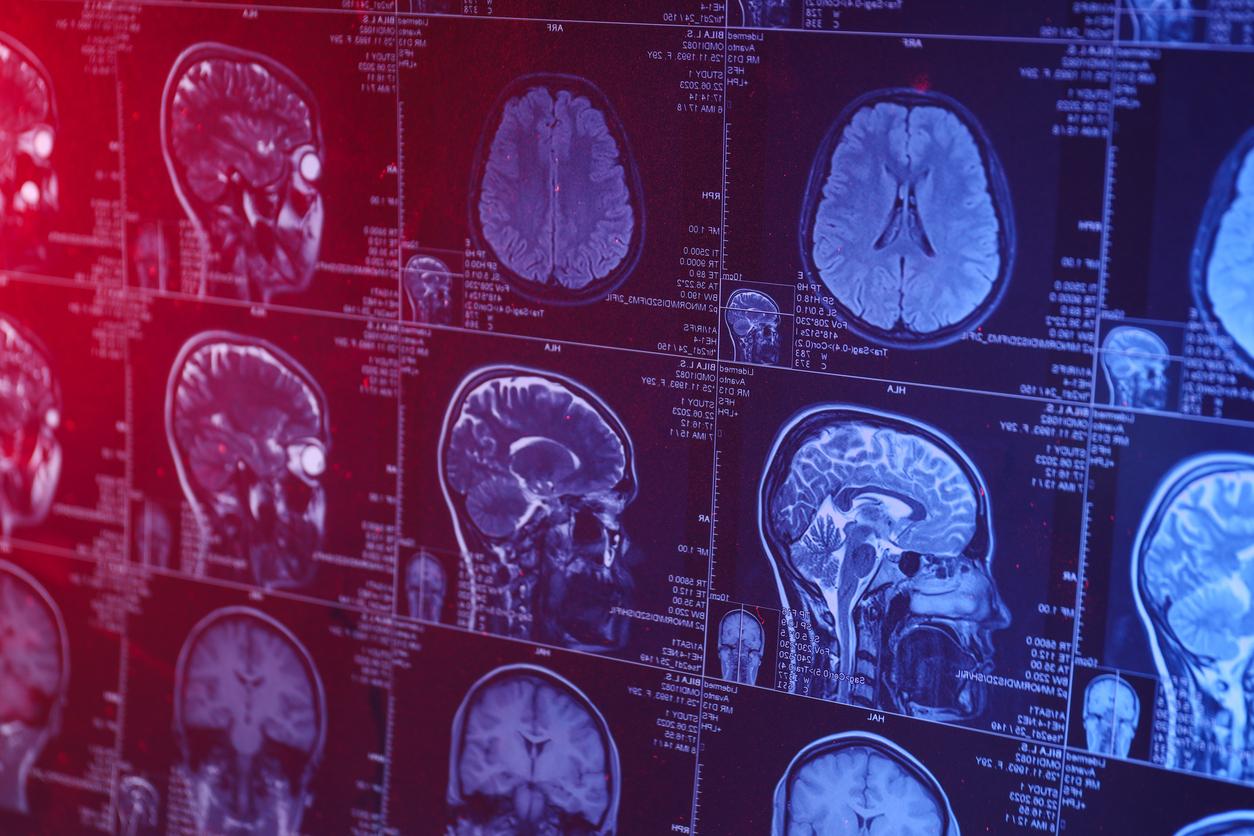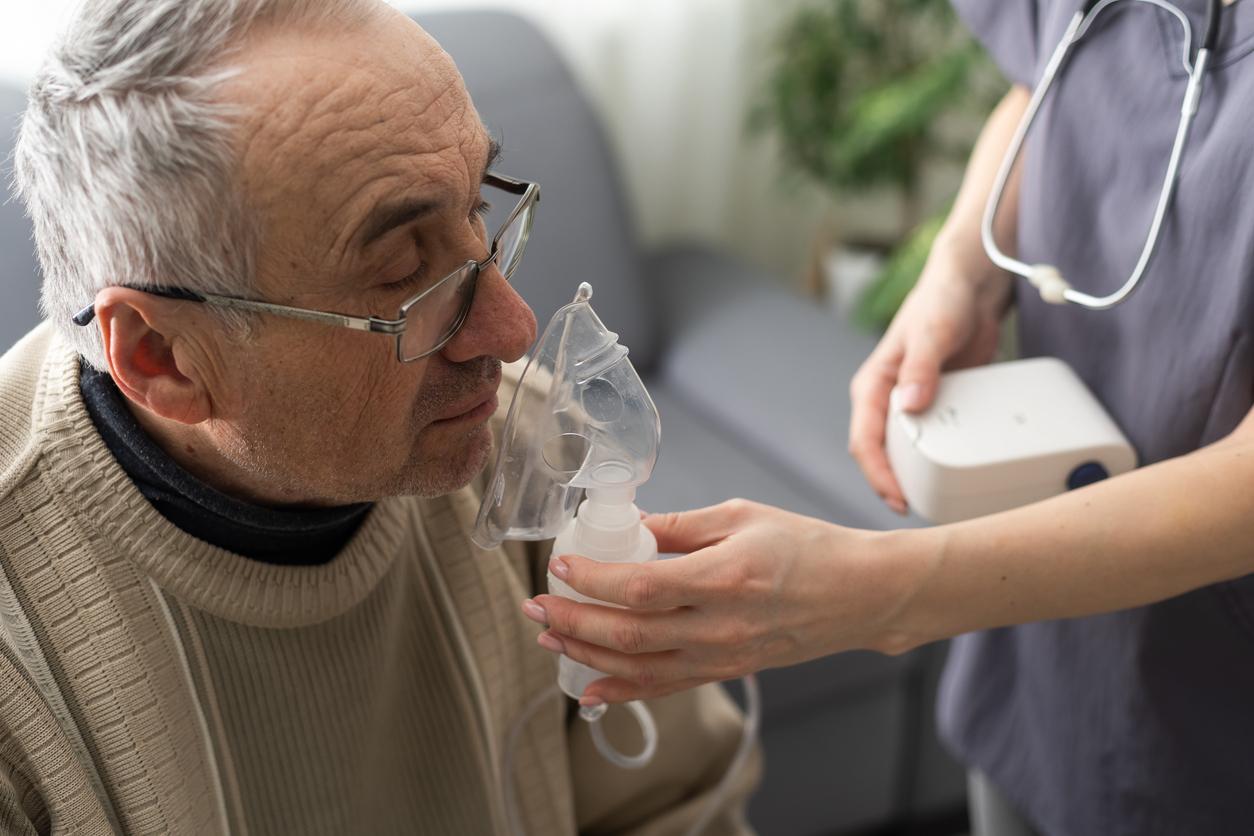A chronic skin disease that results in plaques covered in squamous cells, psoriasis is not contagious but stigmatizing and is often experienced as a real handicap. With Professor Marie-Aleth Richard, head of the dermatology department at the Timone hospital in Marseille, an update on the treatments, whether local or systemic, that can control the disease.

– Why Doctor: How does psoriasis manifest itself?
Pr Marie-Aleth Richard : Psoriasis is a chronic inflammatory skin disease, that is, it does not heal: treatment only controls the formation of new lesions, but they recur in the absence of treatment. It is characteristic in its classic form, which results in red patches covered with scales, most frequently on the elbows, knees, sacrum, navel, scalp, back of the hands, nails, but can also affect the genital area.
“Psoriasis, a disease that affects all ages”
It is not a disease that “degenerates” and can therefore turn into cancer, but when the lesions are very thick, they can crack and split, which can be extremely painful, particularly when psoriasis is located on the palms and soles.
– At what point in life can the disease appear?
It is a pathology that affects all ages of life, essentially with two moments of occurrence, around the age of 19-20 years – even if there are forms in children – and late occurrences around 60 or 70 years without there having been any warning signs before. The prevalence is approximately 2% to 3% of the adult population.
– What are the causes of psoriasis?
It is an inflammatory disease that is linked to a genetic predisposition that concerns certain genes of the immune system.
– Some people sometimes make the link between stress and the appearance of psoriasis…
The word stress doesn’t mean anything! When you have an infection, when you’re tired, it’s stress. So overall in people who are born to be predisposed to psoriasis, certain external events, which are all stresses, taking medication, inflammations, neurological problems, fatigue, a viral or bacterial infection beyond emotional life events can induce psoriasis flare-ups. The word stress covers any episode of aggression that can explain why certain flare-ups are triggered.
– Are there different forms of psoriasis?
There are in fact several forms of the disease. There are rare forms called erythrodermic where the entire skin is affected in the case of an intense outbreak, pustular forms, forms only localized to the palms, feet.
“Once you start getting plaques, you’ve got them for life.”
There are those who have attacks and in the meantime have almost nothing, it is quite rare, others in whom the disease is always present when it is not treated. But in the majority of cases, when you start to have plaques, you have them for the rest of your life. And the disease can get worse over time with more and more lesions over the years.
Psoriasis has the particularity that it can be associated with other pathologies. 30% of skin forms can be associated with joint diseases in what is called psoriatic rheumatism, which results in painful, swollen joints that can become deformed. This pain can affect the joints of the fingers, hands or feet, elbows, knees, wrists, but it can also affect the joints of the spine. In this case, this makes the disease complex because in addition to the plaques, you have pain and fatigue and this joint pain can make you less independent.
“Psoriasis is not a contagious disease!”
There may also be in the most severe forms of psoriasis, those where there are many lesions, a tendency to develop metabolic syndromes, that is to say, having to take care of people who suffer from obesity, who have cardiovascular problems or diabetes in addition to their skin psoriasis. So we know that these people with severe psoriasis are more fragile because they are more obese or have more cardiovascular problems than others and that they must be taken care of because this is part of the disease.
– How is the diagnosis made?
Psoriasis is quite characteristic clinically so there is usually no need for further tests such as blood tests or biopsies.
– Is there a risk of contagion?
Psoriasis is not a contagious disease! It is just stigmatizing because being in front of a person who has plaques can cause reactions of withdrawal or disgust while these plaques do not induce any risk for those around them.
But because of the plaques it causes, this disease is a personal and social handicap. For example, wearing certain clothes is a problem. Wearing a black jacket when you have psoriasis scales on your head is not possible! When you have severe psoriasis, people follow you with a broom because you put scales everywhere, and if you scratch your plaques, you bleed and stain the sheets…! It’s a real pain and you are not always presentable to the general public.

– How is psoriasis treated?
When you want to treat psoriasis, you must always keep in mind that the treatments aim to get rid of the plaques, and that is essentially the role of local treatments. But a general treatment, in tablets or injections, aims not only to get rid of the existing plaques but to ask the body, because it acts internally, to block the formation of new lesions. We cannot therefore summarize the treatment of psoriasis by putting creams on the skin when the disease is widespread.
“Treatments that act on the control of inflammation pathways”
Hence the interest in severe forms of the disease or in articular forms of giving treatments by general route. These treatments have more or less specific modes of operation. You have modes of operation which act on the very targeted control of specific inflammatory pathways of skin psoriasis, others which act in a fairly global way and on several inflammation pathways in the body, which means that they are also active on painful joints.
Conventional systemic treatments are inhibitors of metabolic pathways and can also treat other diseases. Biotherapies, currently in the form of injections, which are produced by genetic engineering, meaning that reconditioned bacteria work to produce specific proteins, will target specific inflammatory pathways specific to the disease.
“Biotherapies are very useful when first-line treatments are not active”
There are also treatments that should not be forgotten, which work when patients do not want to take medications systemically and we need to go beyond creams: these are ultraviolet treatments, i.e. phototherapy which has been used for a very long time and which remains so in certain indications even if it should not be overused because afterwards we can have a problem with skin cancer after too many exposures.
– What criteria are used to choose the treatment?
The criteria are based on compliance with the first lines of treatment that are imposed on us in the context of the marketing authorization in the case of general treatment: the first reference treatment is methotrexate, an oral immunomodulatory anti-inflammatory treatment that is not specific for psoriasis. If there is a contraindication or if this treatment does not work or when it is poorly tolerated, we can offer a second biotherapy, which is more effective because it is more specific and often better tolerated… but much more expensive! The ranges of treatment costs are still very wide. This can go from 40 euros per month to 1700-1800 euros per month.
But we do not have to take the most hi-tech molecules to manage all the problems. But on the other hand, they are very useful when first-line treatments are not active, are not tolerated – among clinical intolerances to methotrexate, we often note nausea, fatigue, digestive intolerances and among biological intolerances we can have exceptional liver fibrosis – or are contraindicated.
– Psoriasis cannot be cured. Does it require lifelong treatment?
The concept was to say that when you start a treatment, it is for life if you want to control the disease. With the problem that there may be at some point with certain treatments a loss of effectiveness. However, there are patients who try to stop the treatments by not accepting this constraint and most often there may be relapses.
“There is still a problem with access to psoriasis treatments”
With the most modern drugs, when given very early in the onset of the disease, we manage to block immunological elements which mean that by treating very intermittently, that is to say with very long delays between the administrations of treatments, we can manage to control psoriasis as if it were practically cured spontaneously.
– Are there any ways to improve the management of the disease?
There is always research for the development of molecules in the treatment of psoriasis because there are patients who have very severe diseases and who are a little at the end of their rope from all the treatments that have been offered to them. And there are always windows of opportunity to have new concepts, for example designing drugs that are currently administered by injection and that could be offered orally with the problem that they still pass through the digestive tract, which is not easy because these are proteins that are supposed to be destroyed by digestion.
– Patient associations mention certain cases of therapeutic wandering in psoriasis. Is this a reality?
Overall, there is still a problem with access to treatments because there are doctors who remain convinced that stress is the cause of psoriasis, so their patients have to go see psychiatrists or psychologists. This is not reasonable. There are enough possible treatments to change people’s lives! It is one of the most rewarding diseases because patients tell you when you manage to find the right solution with them.you have changed my life” ! They never had a normal life because they were covered in shame in front of the gaze of others. And on top of that there are health professionals who tell them “I can’t do anything for you”which is hard to accept! Which is unfortunately the case for many skin diseases, there are some left on the sidewalk, it’s almost a loss of opportunity!

















